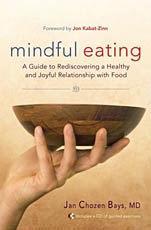• "Mindful eating is nonjudgmental.
• "Awareness is the key to change. Once we are aware of something, it cannot remain the same. Awareness plus small changes in our automatic behaviors can produce large changes over time.
• "Learn to assess stomach and cellular hunger before you eat, during eating, and after eating.
• "If you are not hungry, don't eat.
• "Be present for at least the first three bites or sips as you begin to eat or drink.
• "Eat small portions, considering 'right amount.' Serve yourself an amount of food that will leave you two-thirds full.
• "Eat slowly, savoring each bite. Find ways of pausing as you eat, such as putting down your fork or spoon between bites.
• "Chew your food thoroughly before swallowing.
• "Become aware of the difference between 'no longer hungry' and 'full.' There is no need to eat all the way to 'full.' Eat until you are two-thirds full, then take a drink and rest a bit.
• "Mindful eating includes mindless eating. You can choose to eat mindlessly when it is appropriate.
• "Emptying is as important as filling. This applies both to the stomach and to the mind.
• "At least once a week, eat an entire meal in silence and mindfulness.
• "Know that food changes mood and use it as good medicine. Adjust the dose; a small amount may work better than a lot.
• "Remember the energy equation: balance the energy going into your body with the energy going out.
• "Above all, know when it is not the body but the heart that is asking to be fed. Give it the nutrition that fills it up. That nutrition could be meditation or prayer, walking, being in nature, listening to or making music, playing with a pet, fixing food for someone you love or who needs help, or just sitting and being present with people. Fill the heart with the richness of this very moment.
• "Before, during, and after eating, give thanks."
